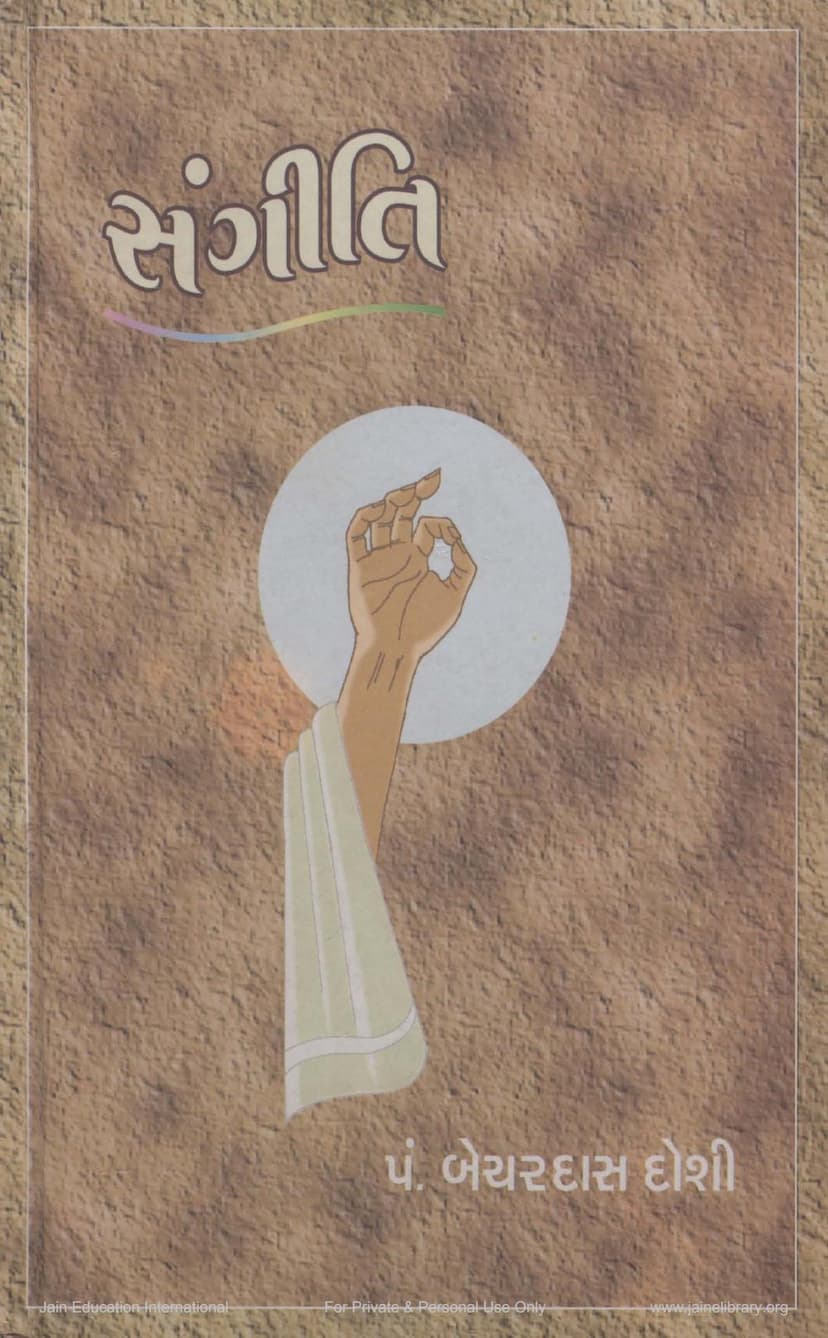Sangiti
Added to library: September 2, 2025

Summary
Here's a comprehensive summary of the Jain text "Sangiti" by Bechardas Doshi, based on the provided pages:
Title: Sangiti (સંગીતિ) Author: Pandit Bechardas Jivaraj Doshi Publisher: Gurjar Granthratna Karyalay, Ahmedabad Year of Publication: December 2003 (First Edition) Price: Rs. 180/-
Overview:
"Sangiti" is a collection of reflective and original essays by Pandit Bechardas Jivaraj Doshi. The book, published by Gurjar Granthratna Karyalay, aims to present Pandit Bechardas's profound thoughts on religion and philosophy, which are characterized by originality and elements of revolutionary insight. The collection is intended to guide curious readers.
Pandit Bechardas Jivaraj Doshi (1889-1982):
The book serves as a tribute to Pandit Bechardas Jivaraj Doshi, a highly learned scholar, deeply versed in Sanskrit, Prakrit, and various Indian languages. He was an authority on Jain Agamas and the Pali Tripitaka and a profound student of Indian philosophies. His extensive literary contributions include editing numerous texts, translating complex works, and authoring original books. He also wrote over 200 articles for prestigious magazines like "Prabuddh Jeevan," "Akhand Anand," and "Puratatva."
Key Themes and Content:
The book's contents are diverse, covering various aspects of Jainism, Buddhism, ethics, and philosophy, as indicated by the table of contents and the provided excerpts. The essays showcase Pandit Bechardas's analytical approach and his dedication to understanding the core principles of these traditions.
Notable Essays/Topics Covered:
The provided pages highlight several key essays and themes:
- Bhagwan Mahavir: Several essays are dedicated to Lord Mahavir, discussing his life, teachings, his role as a breaker of traditions, and his emphasis on compassion and non-violence. The text explores his pre-enlightenment life, his spiritual journey, and the essence of his teachings, drawing parallels with concepts from other traditions.
- Lord Buddha: The collection also features essays on Lord Buddha, including discussions on his birth, his path to enlightenment, his teachings on the ten paramitas (perfections), and comparisons between Jain and Buddhist philosophies.
- Moral and Ethical Principles: Essays delve into fundamental Jain ethical principles such as Ahimsa (non-violence), Asteya (non-stealing), Aparigraha (non-possession), Brahmacharya (celibacy), and the concept of forgiveness and repentance (Kshama and Kshamaapana). These essays analyze the practical application and philosophical underpinnings of these virtues.
- Social Commentary and Critique: Pandit Bechardas offers his reflections on the contemporary state of Jain society, criticizing blind faith, outdated rituals, and social evils. He discusses the need for reform and a deeper understanding of Jain principles, emphasizing that true spirituality lies in inner transformation rather than outward rituals. He also touches upon the controversial issue of Muhapatti (mouth covering) and its historical and practical context.
- Comparative Philosophy: The book engages in a comparative analysis of Jain and Buddhist thought, highlighting similarities and differences in their philosophical underpinnings.
- The Nature of Wealth and Renunciation: The essays explore the concept of true wealth, contrasting material possessions with spiritual wealth like faith, conduct, knowledge, and renunciation.
- The Importance of Prayer and True Worship: The text examines the essence of prayer and distinguishes between superficial ritual and genuine, heartfelt devotion that leads to success and inner peace.
- The Nature of Samsara and the Human Condition: Pandit Bechardas reflects on the cyclical nature of life, the inevitability of suffering, and the human struggle with desires, attachment, and the pursuit of happiness. He critiques the superficiality that often pervades religious practices and the disconnect between ritualistic observance and genuine spiritual growth.
- The Role of Reason and Critical Inquiry: There's an emphasis on the importance of critical thinking and questioning, even within religious contexts, to arrive at a deeper, more authentic understanding of truth.
- The Legacy of Great Souls: The book honors the contributions of great spiritual figures like Lord Mahavir and Lord Buddha, emphasizing the need to understand their teachings in a practical, human context rather than through mere ritualistic veneration.
Editorial and Publishing Details:
The book was compiled and edited by Jitendra B. Shah. The publication process involved the active collaboration of the staff at Shardaaben Chimanbhai Educational Research Center. The publisher, Amarbhai Thakorlal Shah, expresses gratitude to Pandit Bechardas and his family for their close relationship and inspiration. The publisher also acknowledges the significant contribution of Jitendra B. Shah in selecting and compiling the essays.
Overall Significance:
"Sangiti" is a significant work that offers a mature and insightful exploration of Jain philosophy and its broader implications for life. Pandit Bechardas Doshi's writings are characterized by their intellectual rigor, critical analysis, and a deep concern for the spiritual and social well-being of humanity. The book serves as a valuable resource for anyone seeking a deeper understanding of Jainism and the timeless wisdom of its great spiritual leaders.